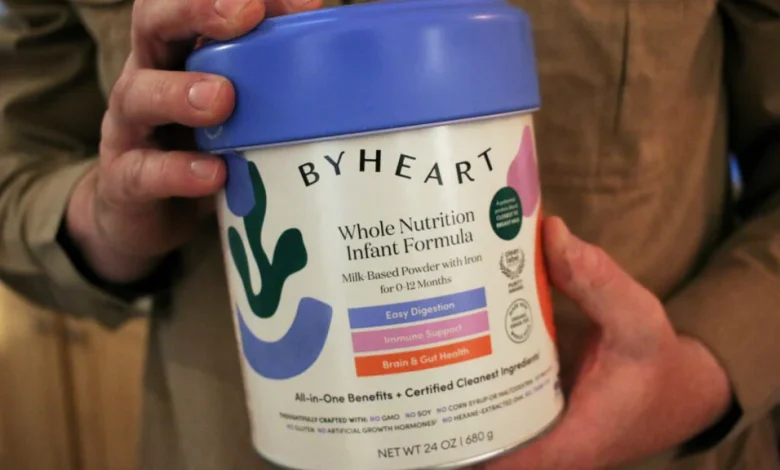ByHeart’s ‘bizarre’ response to infant botulism outbreak worries food safety experts

There are a few unusual things about the infant botulism outbreak that prompted formula maker ByHeart to recall all of its products across the U.S. this week.
The first is that regulators found a link between formula and infant botulism at all. The risk from formula is generally considered very low for the potentially fatal condition, which is caused by bacterial spores found in dust and soil. (Honey contaminated with the spores is a common infant botulism cause.) So far 23 infants as of Friday have been hospitalized after consuming ByHeart formula at some point. No deaths have been reported.
Even more surprising to some food safety experts is ByHeart’s response to the outbreak, from initial communications that they say minimized the risk to consumers to consistently implying that they disagree with regulators’ findings. “There is no reason to believe that infant formula can cause infant botulism,” the company’s co-founder Mia Funt said in a video posted to ByHeart’s Instagram over the weekend, explaining that the initial recall of two lots arose from an “abundance of caution.” (The recall would expand to include all products a few days later.)
“My big takeaway is the extent to which ByHeart has gone out of the way to put its own spin on this outbreak investigation,” said Sarah Sorscher, director of regulatory affairs at the consumer advocacy nonprofit Center for Science in the Public Interest. “I have never seen a company so aggressively fight to deny the evidence against them.”
Susan Mayne, a former director of the Food and Drug Administration’s food safety center, said that the expanded recall notice from ByHeart struck a markedly more serious tone in conveying the urgency of the issue and expressed more of a commitment to working with regulators. The earlier communications missed the mark, she said, which “may be due to inexperience; they’re a relatively new company.”
STAT Plus: Inside the looming crisis in the infant formula market
“ByHeart’s number one priority is protecting babies,” ByHeart spokesperson Bernadette Tortorella told STAT on Wednesday, saying that the company “acted immediately, working in close collaboration with the FDA” after being informed of findings in its infant botulism investigation.
Customers flooded ByHeart’s social media page to express anger over the company’s handling of the outbreak. “This recall should have happened days ago,” commenter Alex Guarino Covino said on Instagram in response to the expanded recall, “yet ByHeart has downplayed, buried information, and misled parents at every step.” At least two families of babies hospitalized with infant botulism after drinking ByHeart’s formula filed lawsuits against the company this week.
How ByHeart pushed back against regulators
ByHeart was founded in 2016 by Funt and her brother Ron Belldegrun, becoming the first new entrant in the notoriously consolidated infant formula market to register with the FDA in 15 years. It currently has about a 1% share of U.S. formula sales, and experts concerned about the precarity of the formula supply chain, as exposed in the 2022 infant formula shortages, are generally rooting for smaller players to succeed.
“We don’t want to see a company be destroyed [by an outbreak], we want to figure out what happened and get them back on their feet,” said Steven Abrams, a professor of pediatrics at Dell Medical School at the University of Texas at Austin.
Backed by venture capital and valued at $908 million, according to Pitchbook, ByHeart is aimed at health-conscious, higher-end consumers and marketed with an emphasis on “clean ingredients,” the fact that it’s made with organic whole milk rather than skim milk, and a patented protein blend the company says more closely resembles breast milk compared to other formulas.
Some of the company’s marketing appeals to “crunchy” moms who share the Make America Healthy Again movement’s antipathy for things like seed oils in formula. A June op-ed by Belldegrun pegged to the Trump administration’s Operation Stork Speed, an initiative to improve the quality and availability of infant formula, counted “reducing the need for added oils like soy or palm” as among the benefits of using whole milk instead of skim. On social media, Funt and Belldegrun posted about taking meetings in D.C. after the Stork Speed initiative was announced: “We’re in the era of the confident parent,” Funt said. “Parents are leaning in, they’re asking hard questions.”
ByHeart’s $42 cans are available at 6,000 stores, including Target, Amazon, Walmart, and Whole Foods, and can also be purchased at a discount via the company’s mail-order subscription plans.
Sign up for Morning Rounds
Understand how science, health policy, and medicine shape the world every day
The company has received the most criticism for its initial post on Nov. 8 alerting customers to a voluntary recall on two batches of formula linked to the FDA’s infant botulism investigation. “There was language in there that I know FDA communicators would have asked the company to remove from the post,” Mayne said — for example, saying the recall came from “an abundance of caution,” which implied to consumers that the risk was low.
The company has also consistently noted in public statements that 83 cases of infant botulism have been reported to the FDA since August of this year, a figure repeated in many news reports. (As of Nov. 10, it’s 84 cases, of which 36 had any exposure to infant formula.) The problem: “That’s extraneous information and it’s led to confusion,” said Mayne. What matters is the number of cases linked to ByHeart specifically, which currently stands at 23, meaning that the brand is “disproportionately represented among sick infants in this outbreak,” according to the FDA.
The function of including the larger number, Sorscher argued, “was to downplay the evidence against them.”
Another noteworthy element of ByHeart’s response to the outbreak is that it’s repeatedly called on regulators to test its unopened cans of formula for Clostridium botulinum, the bacterial cause of infant botulism that can lead to respiratory failure and death if left untreated. Its initial alert included lines in boldface, underscored type saying that “without test results from an unopened can, there is no confirmed link” between the formula and the outbreak.
The approach was “bizarre,” said Sorscher. “You never see that sort of bickering over the details of the outbreak investigation in a public alert. The purpose of the public alert is to tell consumers what product they need to throw out and why.”
Moreover, Mayne said, even if regulators or ByHeart’s third-party laboratory test unopened cans of the formula and don’t find the pathogen, “that doesn’t mean it wasn’t there. Contamination can be sporadic,” occurring in just part of a lot of formula. “Even within a can, infant formula is not a homogenous product. It clumps together.” Because negative tests can’t be taken as proof that formula is free of contamination, “over-reliance on testing is not something that food safety professionals would be comfortable with.”
On Nov. 9, ByHeart released a new update acknowledging a test result from the California Department of Public Health that said it had found the bacteria present in a can of formula that had been fed to an infant. ByHeart said it was testing the recalled batches with a third-party laboratory, but added a caveat about the state’s finding: “testing from a previously-opened can lacks scientific basis to establish causation between the product and illness.” And a day later, on Nov. 10, a new letter from the company persisted in pushing for federal and state agencies to test unopened cans of the ByHeart formula.
STAT Plus: RFK Jr. presses infant formula makers on seed oils, supply chain, and contaminants
It was only on Nov. 11 that ByHeart struck a different tone while announcing a nationwide recall of all its formula, explaining, “The decision to broaden our recall to all ByHeart products comes after a call with the FDA late last night, informing us that they found two more cases of infant botulism in babies that had also consumed ByHeart at some point.” The new letter does not use language that could imply to consumers that the product is safe to continue using.
Until that last move, “they were in denial that their product had caused this outbreak,” said Sorscher. “And also I think they were concerned about the cost and the disruption of doing a nationwide recall because [of] the way their pricing model works. People are buying like months and months of formula in advance and they’re on a subscription, so it’s a lot of money.”
ByHeart’s FDA warning letter and previous recall
ByHeart has faced other issues in its relatively limited time on the market. The company voluntarily recalled five batches of formula in 2022 over possible cross-contamination with a different bacteria, Cronobacter sakazakii. “It is important to note that the 2022 recall was not related to findings regarding ByHeart’s own manufacturing facility,” company spokesperson Tortorella said.
The company also received a warning letter from the FDA in August 2023 over problems identified in inspections of its Pennsylvania facility, one of the company’s three plants in the U.S. The New York Times reports that a December 2023 inspection of the Pennsylvania plant by the FDA found problems including a leaking roof and more than 2,500 dead bugs. “Two major recalls and a warning letter in 3 years is NOT a good track record, especially in such a critical category intended for the most vulnerable,” Frank Yiannis, a former deputy commissioner for food policy and response at the FDA, wrote in a blog post this weekend.
ByHeart noted it took action to address the issues identified in its 2023 warning letter, and that this week’s nationwide product recall did not involve the Pennsylvania facility, which has not been used for production this year.
Mayne said that ByHeart’s previous regulatory run-ins “should be interpreted in the context of the FDA’s attempts to try to really shore up food safety practices and infant formula manufacturing facilities.” The FDA has implemented a broader crackdown on safety practices in the aftermath of the 2022 Abbott Nutrition formula recall and subsequent plant closure when four babies became sick, and two died, after consuming the company’s formula. (The FDA could not confirm that Abbott’s products had caused the illness.)
The upshot is that all infant formula companies are facing closer scrutiny. It’s hard to say what impact cuts to the FDA this year may have had on these oversight efforts, Mayne said, but the FDA has lost “many inspectors” in 2025, and the tumult also led to the departure of “career leaders with decades of experience who were critically important during the prior infant formula outbreak.”
Abbott did some spin of its own back in 2022, Sorscher said. But when it comes to ByHeart, “the amount of energy they’ve invested in damage control is unusual — I would say, unprecedented.”
Infant botulism on the rise in the U.S.
There are broader lessons to be gleaned from the current outbreak. For one thing, apart from the ByHeart recall, it’s also worrying that overall rates of infant botulism have gone up nationwide in recent months, said Abrams. The U.S. typically records about 100 cases of infant botulism per year and saw 181 in 2021, the most recent data available from the Centers for Disease Control and Prevention, compared to 84 cases between Aug. 1 and Nov. 10. The FDA and CDC are investigating the broader outbreak along with California’s department of public health.
“My concern is that there are more people ignoring guidance not to give babies honey,” Abrams said, which should not be given to babies under 12 months of age because of the risk of botulism. Some “natural” brands and influencers recommend honey as an herbal remedy for children, and parents may not realize the potential risks for infants. “There are people who are kind of ‘back to nature,’” going for raw milk and questioning vaccines, Abrams said. But the risks of infant botulism are real: “Nobody wants their baby in an ICU on a ventilator for two weeks.”
Mayne also said that Operation Stork Speed should prioritize microbial contamination as an issue. “They have focused much more on trace contaminants in infant formula,” like heavy metals, she said.
While the government shutdown didn’t impact the staff that work on outbreaks, Abrams noted that the FDA is understaffed despite the need for a “vigorous enforcement process.” Sorscher also pointed out that the Washington, D.C., office of the CDC was eliminated in October, which would have normally briefed policymakers about the process behind the ByHeart investigation and findings. “That’s especially troubling in a situation like this where there’s some skewed information being put out by the company,” she said.
This story has been updated.
STAT’s coverage of chronic health issues is supported by a grant from Bloomberg Philanthropies. Our financial supporters are not involved in any decisions about our journalism.





